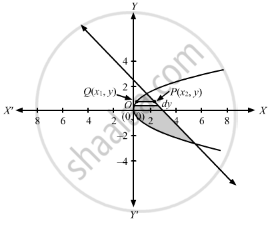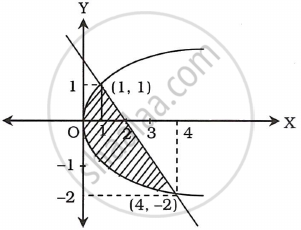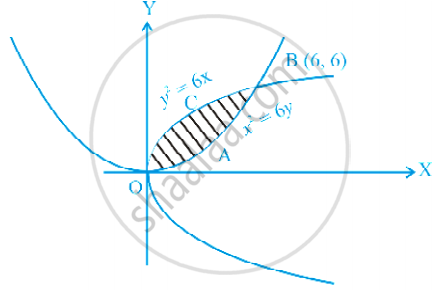Advertisements
Advertisements
Questions
Find the area of the region included between the parabola y2 = x and the line x + y = 2.
Find the area enclosed by the parabola y2 = x and the line y + x = 2.
Solution 1

We have,
\[y^2 = x\] and \[x + y = 2\]
To find the intersecting points of the curves ,we solve both the equations.
\[y^2 + y - 2 = 0\]
\[ \Rightarrow \left( y + 2 \right)\left( y - 1 \right) = 0\]
\[ \Rightarrow y = - 2\text{ or }y = 1\]
\[ \therefore x = 4 \text{ or }1\]
\[\text{ Consider a horizantal strip of length }\left| x_2 - x_1 \right|\text{ and width }dy\text{ where }P\left( x_2 , y \right)\text{ lies on straight line and Q}\left( x_1 , y \right)\text{ lies on the parabola }. \]
\[\text{ Area of approximating rectangle }= \left| x_2 - x_1 \right| dy ,\text{ and it moves from }y = - 2\text{ to }y = 1\]
\[\text{ Required area = area }\left(\text{ OADO }\right) = \int_{- 2}^1 \left| x_2 - x_1 \right| dy\]
\[ = \int_{- 2}^1 \left| x_2 - x_1 \right| dy .............\left\{ \because \left| x_2 - x_1 \right| = x_2 - x_1 as x_2 > x_1 \right\}\]
\[ = \int_{- 2}^1 \left\{ \left( 2 - y \right) - y^2 dy \right\}\]
\[ = \left[ 2y - \frac{y^2}{2} - \frac{y^3}{3} \right]_{- 2}^1 \]
\[ = \left[ 2 - \frac{1}{2} - \frac{1}{3} \right] - \left[ - 4 - 2 + \frac{8}{3} \right]\]
\[ = 2 - \frac{1}{2} - \frac{1}{3} + 6 - \frac{8}{3}\]
\[ = \frac{9}{2}\text{ sq units }\]
\[\text{ Area enclosed by the line and given parabola }= \frac{9}{2}\text{ sq units }\]
Solution 2
y2 = x,
x + y = 2
i.e. x = 2 – y
Solving the equations:
y2 = 2 – y,
i.e. y2 + y – 2 = 0
i.e. (y + 2)(y – 1) = 0
∴ y = 1, – 2
∴ x = 1, 4 (respectively)
Points of intersection of parabola and line
= (1, 1) and (4, – 2)

Also the line cuts X-axis at (2, 0)
Area above X-axis
= `int_0^1 sqrt(x) dx + int_1^2(2 - x)dx`
= `2/3[x^(3/2)]_0^1 + [2x - x^2/2]_1^2`
= `2/3 + (4 - 2) - (2 - 1/2)`
= `2/3 + 2 - 3/2`
= `(4 + 12 - 9)/6`
= `7/6` ...(1)
Area below X-axis
= `|int_0^4 sqrt(x) dx| - |int_2^4(2 - x)dx|`
= `2/3[x^(3/2)]_0^4 - [2x - x^2/2]_2^4`
= `2/3(8) - |[(8 - 8) - (4 - 2)]|`
= `16/3 - |(-2)|`
= `16/3 - 2`
= `10/3` ...(2)
From (1) and (2)
Required area = `7/6 + 10/3`
= `(7 + 20)/6`
= `27/6`
= `9/2` sq. units
APPEARS IN
RELATED QUESTIONS
Find the area of the sector of a circle bounded by the circle x2 + y2 = 16 and the line y = x in the ftrst quadrant.
Using integration, find the area of the region bounded by the lines y = 2 + x, y = 2 – x and x = 2.
Using integration, find the area of the region bounded by the line y − 1 = x, the x − axis and the ordinates x= −2 and x = 3.
Make a rough sketch of the graph of the function y = 4 − x2, 0 ≤ x ≤ 2 and determine the area enclosed by the curve, the x-axis and the lines x = 0 and x = 2.
Using definite integrals, find the area of the circle x2 + y2 = a2.
Sketch the graph y = | x + 3 |. Evaluate \[\int\limits_{- 6}^0 \left| x + 3 \right| dx\]. What does this integral represent on the graph?
Compare the areas under the curves y = cos2 x and y = sin2 x between x = 0 and x = π.
Find the area of the region bounded by x2 = 16y, y = 1, y = 4 and the y-axis in the first quadrant.
Find the area of the region bounded by the curve \[a y^2 = x^3\], the y-axis and the lines y = a and y = 2a.
Find the area of the region between the circles x2 + y2 = 4 and (x − 2)2 + y2 = 4.
Prove that the area common to the two parabolas y = 2x2 and y = x2 + 4 is \[\frac{32}{3}\] sq. units.
Find the area bounded by the parabola y = 2 − x2 and the straight line y + x = 0.
Find the area of the region {(x, y): x2 + y2 ≤ 4, x + y ≥ 2}.
Find the area bounded by the parabola y2 = 4x and the line y = 2x − 4 By using horizontal strips.
The area bounded by the curve y = loge x and x-axis and the straight line x = e is ___________ .
The area of the region bounded by the parabola (y − 2)2 = x − 1, the tangent to it at the point with the ordinate 3 and the x-axis is _________ .
The area bounded by the curve y2 = 8x and x2 = 8y is ___________ .
Find the area of the region bounded by the parabola y2 = 2x and the straight line x – y = 4.
Find the area of the region bounded by the parabolas y2 = 6x and x2 = 6y.
Find the area of the region bounded by the curve y = x3 and y = x + 6 and x = 0
Using integration, find the area of the region bounded by the line 2y = 5x + 7, x- axis and the lines x = 2 and x = 8.
The area of the region bounded by the circle x2 + y2 = 1 is ______.
Using integration, find the area of the region in the first quadrant enclosed by the line x + y = 2, the parabola y2 = x and the x-axis.
The area of the region bounded by the line y = 4 and the curve y = x2 is ______.
Area of the region bounded by the curve `y^2 = 4x`, `y`-axis and the line `y` = 3 is:
Smaller area bounded by the circle `x^2 + y^2 = 4` and the line `x + y = 2` is.
The area bounded by the curve `y = x^3`, the `x`-axis and ordinates `x` = – 2 and `x` = 1
Find the area of the region bounded by curve 4x2 = y and the line y = 8x + 12, using integration.
For real number a, b (a > b > 0),
let Area `{(x, y): x^2 + y^2 ≤ a^2 and x^2/a^2 + y^2/b^2 ≥ 1}` = 30π
Area `{(x, y): x^2 + y^2 ≥ b^2 and x^2/a^2 + y^2/b^2 ≤ 1}` = 18π.
Then the value of (a – b)2 is equal to ______.
Let the curve y = y(x) be the solution of the differential equation, `("dy")/("d"x) = 2(x + 1)`. If the numerical value of area bounded by the curve y = y(x) and x-axis is `(4sqrt(8))/3`, then the value of y(1) is equal to ______.
Let T be the tangent to the ellipse E: x2 + 4y2 = 5 at the point P(1, 1). If the area of the region bounded by the tangent T, ellipse E, lines x = 1 and x = `sqrt(5)` is `sqrt(5)`α + β + γ `cos^-1(1/sqrt(5))`, then |α + β + γ| is equal to ______.
Area of figure bounded by straight lines x = 0, x = 2 and the curves y = 2x, y = 2x – x2 is ______.
Let g(x) = cosx2, f(x) = `sqrt(x)`, and α, β (α < β) be the roots of the quadratic equation 18x2 – 9πx + π2 = 0. Then the area (in sq. units) bounded by the curve y = (gof)(x) and the lines x = α, x = β and y = 0, is ______.
Find the area of the following region using integration ((x, y) : y2 ≤ 2x and y ≥ x – 4).
Using integration, find the area of the region bounded by y = mx (m > 0), x = 1, x = 2 and the X-axis.
Evaluate:
`int_0^1x^2dx`
